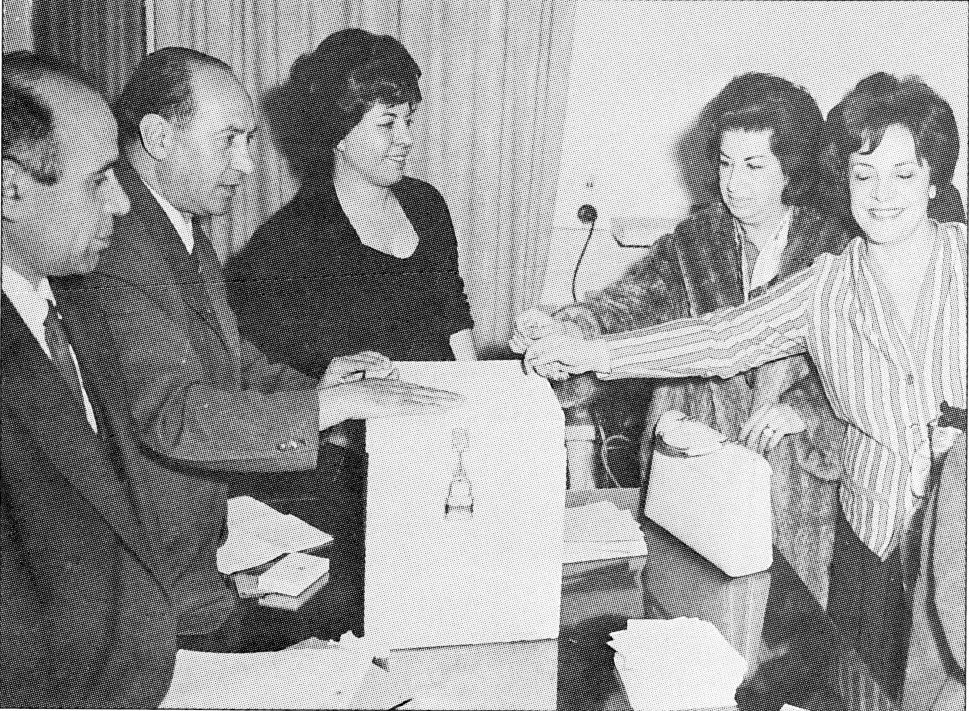1963 Iranian Referendum on:
[Wikipedia]
[Google]
[Amazon]
 A referendum was held in
A referendum was held in
 A referendum was held in
A referendum was held in Iran
Iran, officially the Islamic Republic of Iran (IRI) and also known as Persia, is a country in West Asia. It borders Iraq to the west, Turkey, Azerbaijan, and Armenia to the northwest, the Caspian Sea to the north, Turkmenistan to the nort ...
on 26 January 1963 by the decree of Mohammad Reza Shah
Mohammad Reza Pahlavi (26 October 1919 – 27 July 1980) was the last Shah of Iran, ruling from 1941 to 1979. He succeeded his father Reza Shah and ruled the Imperial State of Iran until he was overthrown by the Iranian Revolution, which ...
, with an aim to show popular support for him, asking voters to approve or veto the reforms of the White Revolution
The White Revolution () or the Shah and People Revolution () was a far-reaching series of reforms to aggressively modernize the Pahlavi Iran, Imperial State of Iran launched on 26 January 1963 by the Shah, Mohammad Reza Pahlavi, and ended with ...
.
Women were not officially allowed to vote, but were set up to vote at their own balloting counters and dedicated boxes, at the suggestion of Ministry of Agriculture Hasan Arsanjani
Hassan Arsanjani (1922–1969) was an Iranian politician. A radical reformer, as the minister of agriculture in the cabinet of Ali Amini, he introduced the program of land reform in Iran. Later on, the shah Mohammad Reza Pahlavi forced him to r ...
. The results gave Iranian women the right to vote
Suffrage, political franchise, or simply franchise is the right to vote in representative democracy, public, political elections and referendums (although the term is sometimes used for any right to vote). In some languages, and occasionally in ...
.
Criticism
Despite the apparent benign nature of the proposals in the referendum, there was significant opposition. Opponents included major landowners,ulema
In Islam, the ''ulama'' ( ; also spelled ''ulema''; ; singular ; feminine singular , plural ) are scholars of Islamic doctrine and law. They are considered the guardians, transmitters, and interpreters of religious knowledge in Islam.
"Ulama ...
and communists.
Ayatollah Ruhollah Khomeini
Ruhollah Musavi Khomeini (17 May 1900 or 24 September 19023 June 1989) was an Iranian revolutionary, politician, political theorist, and religious leader. He was the founder of the Islamic Republic of Iran and the main leader of the Iranian ...
called for boycotting the referendum as "un-Islamic".
National Front boycotted the referendum, criticizing that the measures did not come from the parliament
In modern politics and history, a parliament is a legislative body of government. Generally, a modern parliament has three functions: Representation (politics), representing the Election#Suffrage, electorate, making laws, and overseeing ...
.
Voters were asked six questions, but had only the option to vote yes or no to the total package.
The ballots for 'Yes' were white, while the negative ones were green.
Similar to the previous referendum, polling places lacked secrecy
Secrecy is the practice of hiding information from certain individuals or groups who do not have the "need to know", perhaps while sharing it with other individuals. That which is kept hidden is known as the secret.
Secrecy is often controver ...
and there were two separate voting booths: one for the supporters and one for the opponents. "No sane man would enter the opposition booth", according to Mohammad Gholi Majd
Mohammad Gholi Majd (), also known as M.G. Madjd, is an Iranian author whose primary field of work is modern history of Iran.
Majd obtained a PhD in agricultural economics from Cornell University in 1978, and was a visiting lecturer at the Middle ...
.
Party policies
Results
Aftermath
Following the referendum dissension and riots outbroke in almost all major urban areas, most significantly inTehran
Tehran (; , ''Tehrân'') is the capital and largest city of Iran. It is the capital of Tehran province, and the administrative center for Tehran County and its Central District (Tehran County), Central District. With a population of around 9. ...
and the city of Qom
Qom (; ) is a city in the Central District of Qom County, Qom province, Iran, serving as capital of the province, the county, and the district. It is the seventh largest metropolis and also the seventh largest city in Iran. The city is ...
. The Shah gave orders to immediate suppression of the opposition and National Front, Freedom Movement, Tudeh Party
The Tudeh Party of Iran is an Iranian communist party. Formed in 1941, with Soleiman Mirza Eskandari as its head, it had considerable influence in its early years and played an important role during Mohammad Mosaddegh's campaign to nationalize ...
and religious activists were imprisoned. The unrest made Ayatollah Ruhollah Khomeini
Ruhollah Musavi Khomeini (17 May 1900 or 24 September 19023 June 1989) was an Iranian revolutionary, politician, political theorist, and religious leader. He was the founder of the Islamic Republic of Iran and the main leader of the Iranian ...
the regime's principal opponent in the minds of most Iranians.
References
{{Iranian elections Referendums in IranIran
Iran, officially the Islamic Republic of Iran (IRI) and also known as Persia, is a country in West Asia. It borders Iraq to the west, Turkey, Azerbaijan, and Armenia to the northwest, the Caspian Sea to the north, Turkmenistan to the nort ...
Constitutional referendum
A referendum, plebiscite, or ballot measure is a direct vote by the electorate (rather than their representatives) on a proposal, law, or political issue. A referendum may be either binding (resulting in the adoption of a new policy) or advis ...
Suffrage referendums
Electoral reform referendums
Privatisation referendums
Women's rights in Iran
Women's suffrage in Iran